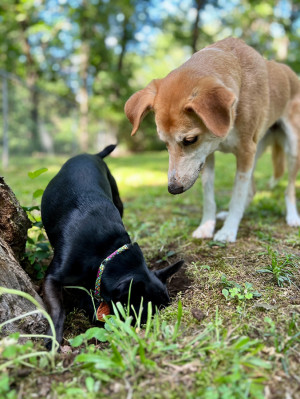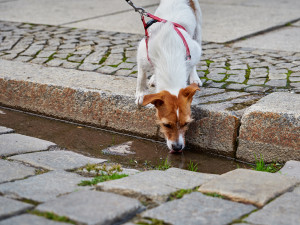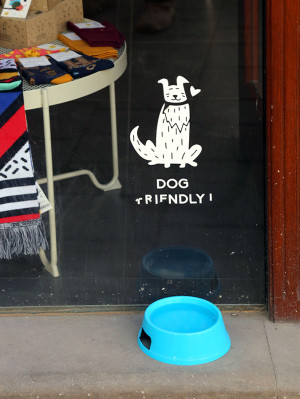Best Dewormer for Puppies
Not everything about caring for a puppy is cute—but unfortunately necessary.

Share Article
In This Article:
About Intestinal Parasites in Puppiesopens in a new tab Why Do Puppies Need To Be Dewormed?opens in a new tab Best Dewormers for Puppiesopens in a new tab Natural Dewormers for Puppiesopens in a new tab Frequently Asked Questionsopens in a new tab
A new puppy brings many things along with them into your home: love, play, cuddles, silliness, and sometimes... worms.
Yup, that’s right. Unfortunately, puppies are prone to intestinal parasites — aka worms — which can cause a range of scary health issues if left untreated. Choosing the right dewormer is crucial to ensure your puppy’s wellbeingopens in a new tab, and to promote healthy growth and development.

littleKin™ is Kinship’s home just for puppy and kitten parents. Bop over to check out expert advice, new pet tools, and special deals—all curated for your newest family member.
opens in a new tabA case of worms is not cause for alarm — it’s pretty commonopens in a new tab and is usually easily treated — but it needs to be taken seriously: Intestinal parasites can lead to serious health problems in puppies. These may include gastrointestinal issues, malnutrition, and stunted growth. Depending on the type of worms, they can also be passed on to pet parents, as well as other pets in your household.
Keep reading to find out more about puppies and worms, including what types of intestinal parasites are most common in dogs, why puppies need to be dewormed, how often you need to do it, and why veterinarians don’t recommend trying to deworm puppies at home using a natural dewormer.
About intestinal parasites in puppies
Veterinarian Dr. Wendy Hauseropens in a new tab says that puppies can pick up a case of intestinal parasites in different ways. “Many are exposed to roundworm and hookworm infections from infected moms, while they are in utero, or through milk.” They can also be exposed to worms while playing outside and digging in the dirt. “Roundworm and hookworm eggs can live in soil for years,” she warns. Other animals can pass them on to your pup, as can fleas.
When we hear “worms,” most of us probably get a similar image in our minds — of the squirmy, slimy variety. And while it’s true that worms of all kinds look more or less alike, puppies are prone to different types of worms, which may require different types of treatments. These are some of the most common intestinal parasites that your sweet pup can come down with:
Roundworms
Roundworms, also called nematodes or ascarids, are the most common type of worms found in dogs. They live in the intestinal tract of their host and feed off of the partially digested food that’s making its way through the digestive system (sorry!). Roundworm infections are zoonotic, which means they can be passed on to humans.
Hookworms
Hookworms are a type of intestinal parasite that mothers can pass to their puppies before birth or when nursing. They can also be transmitted via contaminated soil, water, or poop, when the larvae penetrate the skin — often through the paw pads. The small, thin worms attach the intestines and feed on blood. This can lead to anemia, diarrhea, lethargy, and weight loss, as well as interfering with your puppy’s growth.
Tapeworms
These flat, segmented worms are commonly transmitted through fleasopens in a new tab, and while they aren’t usually life-threatening, they can cause quite a bit of discomfort for your dog. If your pup is dragging their itchy butt on the ground, losing weight, or throwing up, it’ s possible that they have a tapeworm infection. Your veterinarian can diagnose this by examining a stool sample. Tapeworm segments resemble grains of rice, and may be visible in your dog’s poopopens in a new tab or vomit.
Whipworms
Named after their distinctive whip shape, these worms can cause chronic health problems if left untreated. Their eggs are very sturdy, and can survive for years in contaminated soil. Your puppy may ingest them through infected water, food, or poop. Because their eggs can be tricky to spot, your vet may have to do repeated lab tests in order to diagnose them.
Giardia
A parasite that your puppy can pick up from drinking stagnant water, such as that found in puddles or lakes, Giardia is a common cause of diarrhea in dogs. It lives in the intestine and can also cause gas, stomach upset, and vomiting. Sometimes, however, puppies can be infected with giardia and not show any signs at all. Giardia infections peak during the summer months, when puppies and their parents are more apt to be outdoors.
Coccidia
Coccidia are single-celled parasites too tiny to see without a microscope. Puppies can become infected after ingesting oocysts (that’s what this parasite is called during the infectious stage), which may be found in soil, water, food, or poop. Symptoms of coccidiosis include diarrhea, weight loss, lethargy, and occasionally, vomiting. The infection can keep your puppy from growing as expected.
Why do puppies need to be dewormed?
Dr. Hauser recommends that all puppies be preventatively dewormed beginning at two weeks of age. They should continue to be treated every two weeks until they are old enough to be started on a monthly deworming product, when they’re about 12 weeks old.
If you’ re tempted to skip a treatment, you do so at the risk of your puppy's health — and your own. “Several of these parasites are infectious to humans, so it is not only important for the health of the puppy to be dewormed, but also for human family members,” Dr. Hauser says. “A great resource to learn more is at Pets, Parasites and Peopleopens in a new tab.”
Best dewormers for puppies
Your veterinarian is your best resource when choosing a puppy dewormer. They can test your dog for worms and prescribe the right product to treat any infection that may be present. They can also recommend a product and protocol to keep your puppy worm-free in the future. That said, these are some of the most common types of dog worm medicine (also known as anthelmintics) out there.
Pyrantel pamoate
Pyrantel pamoate is commonly used to treat roundworms and hookworms in puppies. It paralyzes the worms, which are then pooped out by your pup. Your vet will give you instructions as to proper dosage and length of treatment.
Fenbendazole
Fenbendazole, sold under the brand name Panacur, is used to treat roundworm, hookworm, whipworm, tapeworm, and giardia infections in puppies. It kills parasites by inhibiting their ability to absorb glucose.
Praziquantel
Praziquantel kills tapeworms by paralyzing them, which prevents them from attaching to the intestinal wall and allowing the host — whether canine or human — to poop them out. As with other deworming medicines, it will be prescribed by a medical professional who can explain how to use it.
Selamectin
Selamectin is a topical medication that’s used to prevent parasitic infections by killing fleas, which can give your puppy worms. Once your puppy is six weeks old, your vet may prescribe it to help keep your puppy worm-free.
Moxidectin
Moxidectin is an effective treatment for roundworms, hookworms, and whipworms. It's available in a topical solution, a tablet given by mouth, and as an injection, and like other anthelmintics, paralyzes the worms and kills them, so they can pass out of the host.
Natural dewormers for puppies
Natural remedies are great for many things — hot tea when you have a sore throat, an oatmeal bath for itchy skin — but when it comes to worms, it’s best to stick to veterinarian-recommended medications. “I would never advise using non-licensed products to deworm a puppy,” Dr. Hauser says.
“There are risks associated with ‘natural remedies,’ especially for very young puppies that are only ingesting milk.” And worms aren’t something to mess around with, she warns. “It is important for puppy owners to recognize that intestinal parasites can be dangerous for both the puppy, other dogs, and humans exposed to the puppy.”
FAQs (People also ask):
How can I get rid of dog worms fast?
Dr. Hauser says it’s important to seek guidance from your veterinarian regarding the best course of action to get rid of your puppy’s wormsopens in a new tab. “They can choose a product that is broad spectrum, will kill the likely parasites present in the area, and is safe.”
How do I know if my dog has worms?
“Sometimes owners see intestinal worms in the stool of puppies, and other times they are microscopic,” Dr. Hauser says. “Clinical signs that might indicate the presence of intestinal parasitesopens in a new tab include a pot-bellied appearance, scooting the anus on the ground, and vomiting or diarrhea.” She recommends having stool samples checked for worm eggs periodically throughout your dog’s puppyhood.
What do worms in dogs look like?
This depends on the type of worm, Dr. Hauser explains. “The most-seen intestinal parasitesopens in a new tab in feces are roundworms, which look like spaghetti, or tapeworms, which look like rice.” Tapeworm segments, she says, resemble sesame seeds. She cautions that many parasites are microscopic, however, which means it’s crucial to have them regularly checked out by a veterinarian.
References:

Elizabeth Laura Nelson
Elizabeth Laura Nelson is a writer and editor based in Brooklyn, New York. As a child, Elizabeth was scared of cats (claws and teeth, yikes) but she has since gotten over her fear and now shares her home with three sweet and gentle feline companions who make life better (and cuddlier) every day.
Related articles
![Dog drinking water from a puddle in the road]() opens in a new tab
opens in a new tabGiardia in Dogs: Signs, Symptoms and Treatment of This Parasite
If your dog drinks from puddles or splashes around in lakes, read this.
![A bright blue public dog bowl with a sign that reads “dog friendly” above it.]() opens in a new tab
opens in a new tabShould You Let Your Dog Drink Out of a Public Water Bowl?
A good basic rule: It’s best to bring your own water.
![man and lab puppy on park road]() opens in a new tab
opens in a new tabWhen, Exactly, Should You Vaccinate Your Puppy?
If it’s time for a round of shots (no, not that kind), follow this guide.
![French bulldog puppy looking scared at vet]() opens in a new tab
opens in a new tab10 Things to Ask at Your First Vet Visit
There are no stupid questions — well, when it comes to your dog’s health.
![feeding black dog rice water to help relieve diarrhea]() opens in a new tab
opens in a new tabVet-Approved Diarrhea Treatments
Shudder. It happens to all of us.







